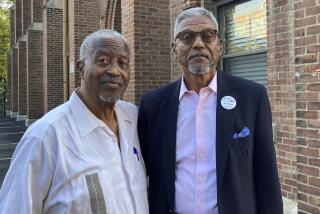Smoke Exposure Was Minimal, Attorneys Say
MIAMI â Lawyers for the countryâs top cigarette makers told jurors Tuesday that flight attendants claiming illnesses from secondhand smoke were exposed to minimal concentrations in airline cabins and have not experienced more health problems than anyone else.
But in a dramatic development as lawyers in the case completed opening statements in the landmark tobacco trial, an attorney for cigarette maker Liggett bluntly distanced the firm from its co-defendants, telling jurors that Liggett has âbehaved responsiblyâ by admitting what the others deny--namely, that smoking causes cancer, emphysema and heart disease and is addictive.
The remarks by Liggett attorney Michael M. Fay were not wholly unexpected, as debt-ridden Liggett, the smallest of the five major cigarette makers, also had made these admissions in March as part of litigation settlement with state attorneys general.
But tobacco companies have pursued a joint defense in all previous liability trials, and analysts said Liggett, in seeking leniency, may have damaged the industryâs case.
In essence, Fay was saying, â âYou just heard what my fellow tobacco companies said and itâs a lot of baloney,â â remarked Calvert D. Crary, a litigation analyst with the investment firm Auerbach, Pollak & Richardson in Stamford, Conn. âNobody has really seen the impact of that at a trial.â
The flight attendants case, filed in 1991, is the first class-action suit in history to be tried against tobacco firms. It is also the first court case of any size to test the industryâs liability for lung cancer and other ailments supposedly suffered by individuals exposed to smoke from other peopleâs cigarettes.
Before Fayâs brief opening statement, lawyers for industry giants Philip Morris and R.J. Reynolds spent three hours promising to dismantle the flight attendantsâ claims.
Hugh R. Whiting, a lawyer for R.J. Reynolds, told jurors the evidence will show that flight attendants experience the same medical problems âthe rest of us get,â and âdo not develop any of the diseases more often than the rest of us.â
Whiting and David Hardy, attorney for Philip Morris and Lorillard, repeatedly invoked the toxicologistâs mantra that âthe dose makes the poisonâ--meaning that the effect of a harmful substance depends on how much one breathes, swallows or absorbs.
Whiting and Hardy said there are no studies showing that airline attendants have experienced unusual patterns of illness. And because secondhand smoke is heavily diluted in the air, particularly in ventilated airline cabins, Whiting said, the attendants could not have inhaled more than the equivalent of a few cigarettes per year.
By contrast, Stanley M. Rosenblatt, lead plaintiffs attorney, had maintained in his opening statement Monday that his clientsâ exposure was heavy before the in-flight smoking ban was imposed because so many passengers were smoking at once.
Whiting told the jury that the case against secondhand smoke is based on faulty science--and he singled out the U.S. Environmental Protection Agencyâs declaration in 1993 that it causes an estimated 3,000 lung cancer deaths per year.
The EPA report--which the industry has gone to court in an effort to void--was part of an effort to give âthe anti-smokers in this country a new arrow in their quiver,â Whiting said. âItâs one thing to say to a smoker, âYou may be hurting yourself.â â But âif people believe it will hurt someone else, itâs a more powerfulâ weapon to fight smoking.
Whiting said the EPA relied mainly on studies showing mildly elevated lung cancer rates among nonsmoking wives of smokers--who he said were exposed to far more smoke than flight attendants were. But he said the evidence will show that even these studies were flawed because they failed to consider alternative explanations.
Moreover, he said, the industry will show that the EPA ignored studies showing no association between secondhand smoke and cancer and improperly blended data from studies it did consider.
By contrast, Liggettâs opening statement lasted a few minutes and was seen by some observers as a plea of mercy for Liggett.
Fay told the jury that unlike its rivals, Liggett freely admits the hazards of smoking. He also pointed out that Liggett had not joined in the lawsuit seeking to void the EPA report on secondhand smoke.
Melissa Ronan, a lawyer and litigation consultant in product liability cases, said Liggett appears to be asking to be spared punitive damages should the industry be found liable in the case.
âLiggett is obviously going to be a disruptive influence,â said Diana K. Temple, a tobacco analyst with Salomon Bros. Inc. But she said jurors might be unimpressed, âparticularly if they learn the circumstances under which the [Liggett] change of opinion occurred.â
Those circumstances will be the subject of testimony next week, when Bennett LeBow, chairman of Liggettâs parent firm, Brooke Group Ltd., is called as a witness.
As recently as 1993, LeBow stated under oath that he did not believe cigarettes were addictive, and industry rivals have challenged the sincerity of the recent admissions, claiming Liggett will say anything to get relief.
* SETTLEMENT SUPPORT SOUGHT
Tobacco lawyers appear eager to get Clintonâs support for settlement. D3
More to Read
Inside the business of entertainment
The Wide Shot brings you news, analysis and insights on everything from streaming wars to production â and what it all means for the future.
You may occasionally receive promotional content from the Los Angeles Times.










